Application of Behavioral Science Theories in Nursing: A Report
VerifiedAdded on 2022/08/31
|6
|1132
|28
Report
AI Summary
This report explores the integration of non-nursing theories, primarily from behavioral sciences, within the field of nursing. It examines how theories such as Erikson's psychosocial development theory, Sullivan's interpersonal theory, and Lazarus and Folkman's Stress Coping Adaptation Theory guide key components of healthcare. The paper highlights the importance of these theories in customizing patient communication, care plan formulation, and understanding patient behaviors. The report emphasizes the need for nurses to utilize both nursing and non-nursing theories to enhance their professional development and improve patient care. The discussion includes the application of these theories in healthcare delivery, administration, and nursing education, concluding with a recommendation for a holistic approach to theoretical and clinical knowledge.
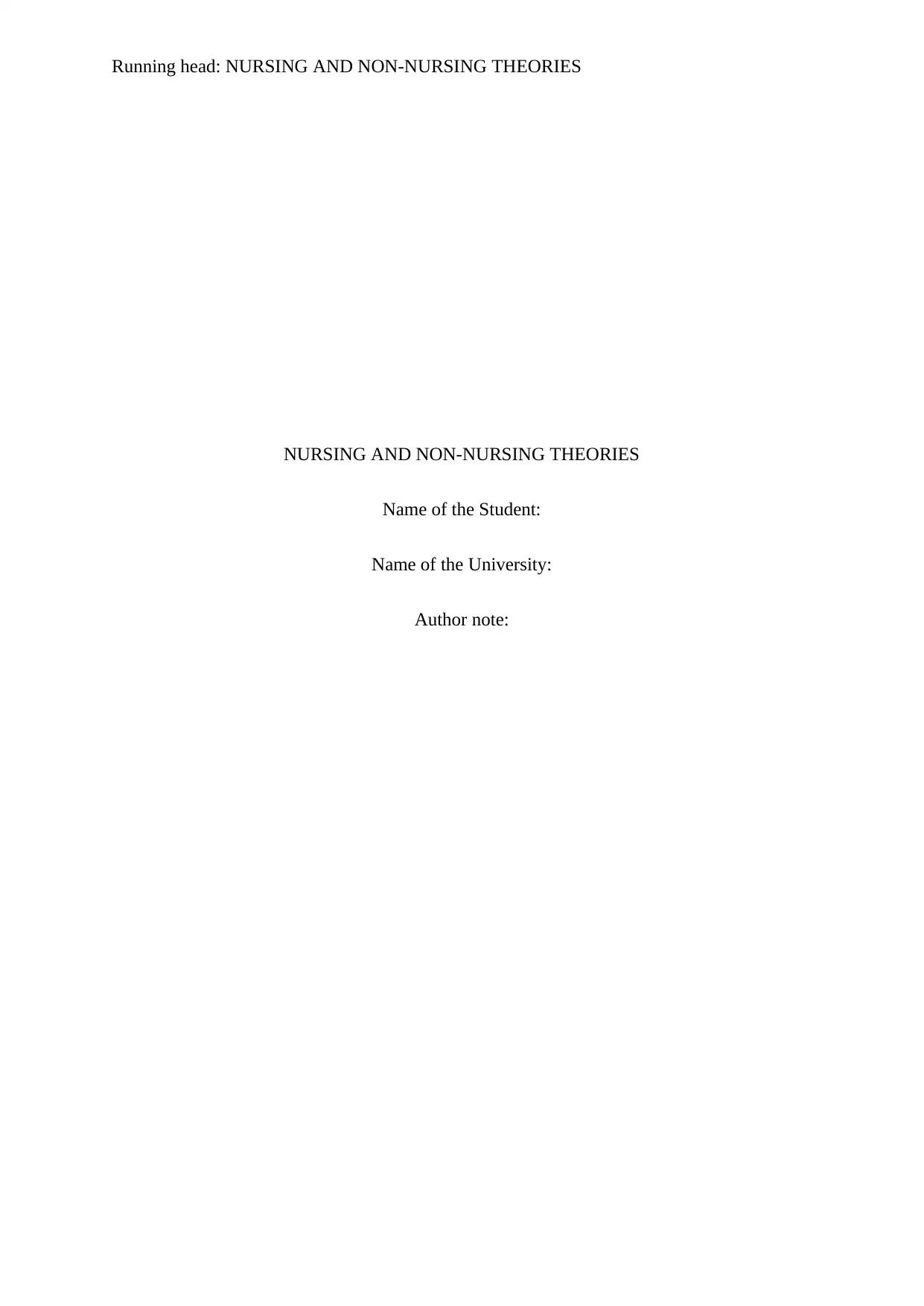
Running head: NURSING AND NON-NURSING THEORIES
NURSING AND NON-NURSING THEORIES
Name of the Student:
Name of the University:
Author note:
NURSING AND NON-NURSING THEORIES
Name of the Student:
Name of the University:
Author note:
Paraphrase This Document
Need a fresh take? Get an instant paraphrase of this document with our AI Paraphraser
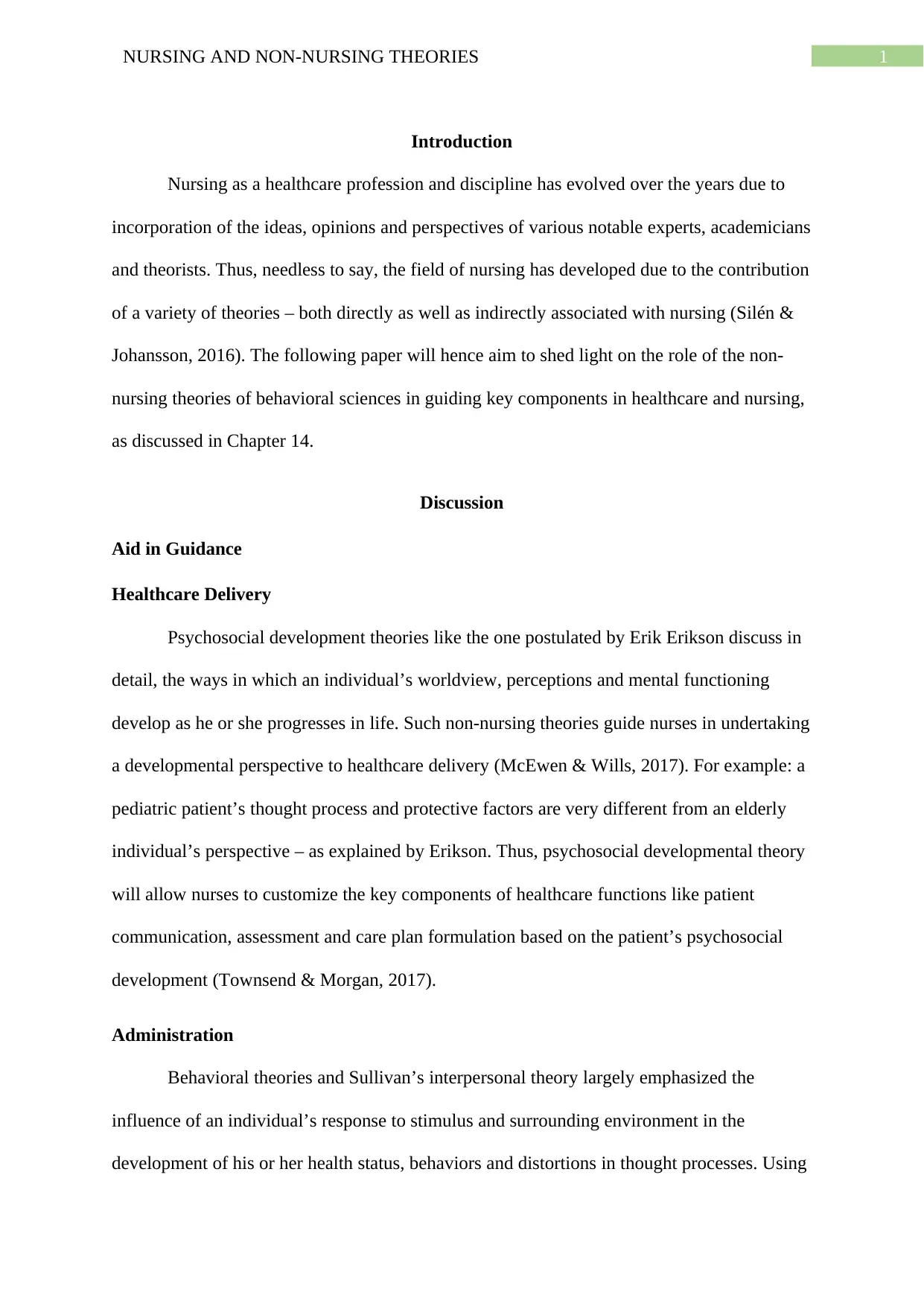
1NURSING AND NON-NURSING THEORIES
Introduction
Nursing as a healthcare profession and discipline has evolved over the years due to
incorporation of the ideas, opinions and perspectives of various notable experts, academicians
and theorists. Thus, needless to say, the field of nursing has developed due to the contribution
of a variety of theories – both directly as well as indirectly associated with nursing (Silén &
Johansson, 2016). The following paper will hence aim to shed light on the role of the non-
nursing theories of behavioral sciences in guiding key components in healthcare and nursing,
as discussed in Chapter 14.
Discussion
Aid in Guidance
Healthcare Delivery
Psychosocial development theories like the one postulated by Erik Erikson discuss in
detail, the ways in which an individual’s worldview, perceptions and mental functioning
develop as he or she progresses in life. Such non-nursing theories guide nurses in undertaking
a developmental perspective to healthcare delivery (McEwen & Wills, 2017). For example: a
pediatric patient’s thought process and protective factors are very different from an elderly
individual’s perspective – as explained by Erikson. Thus, psychosocial developmental theory
will allow nurses to customize the key components of healthcare functions like patient
communication, assessment and care plan formulation based on the patient’s psychosocial
development (Townsend & Morgan, 2017).
Administration
Behavioral theories and Sullivan’s interpersonal theory largely emphasized the
influence of an individual’s response to stimulus and surrounding environment in the
development of his or her health status, behaviors and distortions in thought processes. Using
Introduction
Nursing as a healthcare profession and discipline has evolved over the years due to
incorporation of the ideas, opinions and perspectives of various notable experts, academicians
and theorists. Thus, needless to say, the field of nursing has developed due to the contribution
of a variety of theories – both directly as well as indirectly associated with nursing (Silén &
Johansson, 2016). The following paper will hence aim to shed light on the role of the non-
nursing theories of behavioral sciences in guiding key components in healthcare and nursing,
as discussed in Chapter 14.
Discussion
Aid in Guidance
Healthcare Delivery
Psychosocial development theories like the one postulated by Erik Erikson discuss in
detail, the ways in which an individual’s worldview, perceptions and mental functioning
develop as he or she progresses in life. Such non-nursing theories guide nurses in undertaking
a developmental perspective to healthcare delivery (McEwen & Wills, 2017). For example: a
pediatric patient’s thought process and protective factors are very different from an elderly
individual’s perspective – as explained by Erikson. Thus, psychosocial developmental theory
will allow nurses to customize the key components of healthcare functions like patient
communication, assessment and care plan formulation based on the patient’s psychosocial
development (Townsend & Morgan, 2017).
Administration
Behavioral theories and Sullivan’s interpersonal theory largely emphasized the
influence of an individual’s response to stimulus and surrounding environment in the
development of his or her health status, behaviors and distortions in thought processes. Using
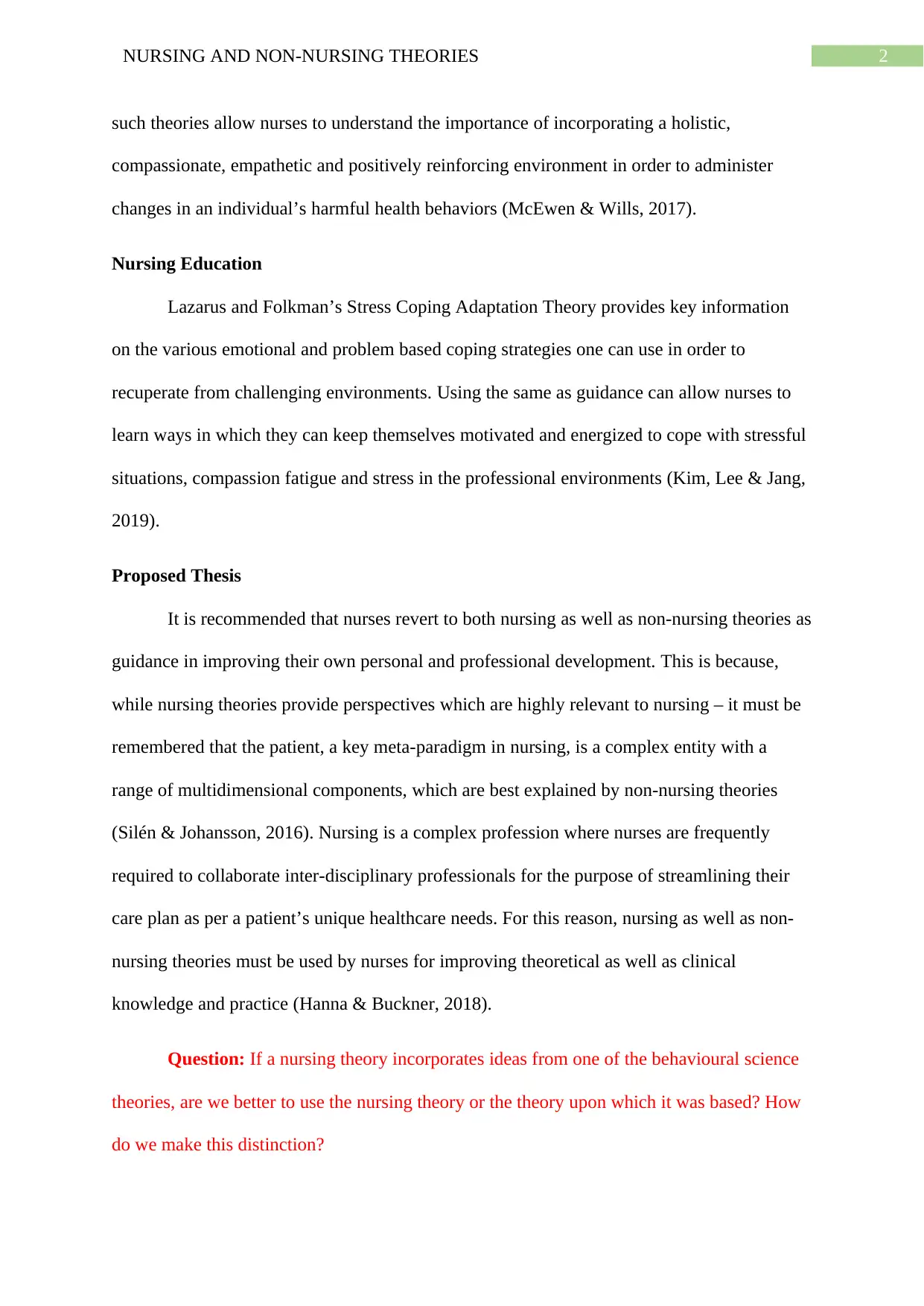
2NURSING AND NON-NURSING THEORIES
such theories allow nurses to understand the importance of incorporating a holistic,
compassionate, empathetic and positively reinforcing environment in order to administer
changes in an individual’s harmful health behaviors (McEwen & Wills, 2017).
Nursing Education
Lazarus and Folkman’s Stress Coping Adaptation Theory provides key information
on the various emotional and problem based coping strategies one can use in order to
recuperate from challenging environments. Using the same as guidance can allow nurses to
learn ways in which they can keep themselves motivated and energized to cope with stressful
situations, compassion fatigue and stress in the professional environments (Kim, Lee & Jang,
2019).
Proposed Thesis
It is recommended that nurses revert to both nursing as well as non-nursing theories as
guidance in improving their own personal and professional development. This is because,
while nursing theories provide perspectives which are highly relevant to nursing – it must be
remembered that the patient, a key meta-paradigm in nursing, is a complex entity with a
range of multidimensional components, which are best explained by non-nursing theories
(Silén & Johansson, 2016). Nursing is a complex profession where nurses are frequently
required to collaborate inter-disciplinary professionals for the purpose of streamlining their
care plan as per a patient’s unique healthcare needs. For this reason, nursing as well as non-
nursing theories must be used by nurses for improving theoretical as well as clinical
knowledge and practice (Hanna & Buckner, 2018).
Question: If a nursing theory incorporates ideas from one of the behavioural science
theories, are we better to use the nursing theory or the theory upon which it was based? How
do we make this distinction?
such theories allow nurses to understand the importance of incorporating a holistic,
compassionate, empathetic and positively reinforcing environment in order to administer
changes in an individual’s harmful health behaviors (McEwen & Wills, 2017).
Nursing Education
Lazarus and Folkman’s Stress Coping Adaptation Theory provides key information
on the various emotional and problem based coping strategies one can use in order to
recuperate from challenging environments. Using the same as guidance can allow nurses to
learn ways in which they can keep themselves motivated and energized to cope with stressful
situations, compassion fatigue and stress in the professional environments (Kim, Lee & Jang,
2019).
Proposed Thesis
It is recommended that nurses revert to both nursing as well as non-nursing theories as
guidance in improving their own personal and professional development. This is because,
while nursing theories provide perspectives which are highly relevant to nursing – it must be
remembered that the patient, a key meta-paradigm in nursing, is a complex entity with a
range of multidimensional components, which are best explained by non-nursing theories
(Silén & Johansson, 2016). Nursing is a complex profession where nurses are frequently
required to collaborate inter-disciplinary professionals for the purpose of streamlining their
care plan as per a patient’s unique healthcare needs. For this reason, nursing as well as non-
nursing theories must be used by nurses for improving theoretical as well as clinical
knowledge and practice (Hanna & Buckner, 2018).
Question: If a nursing theory incorporates ideas from one of the behavioural science
theories, are we better to use the nursing theory or the theory upon which it was based? How
do we make this distinction?
⊘ This is a preview!⊘
Do you want full access?
Subscribe today to unlock all pages.

Trusted by 1+ million students worldwide
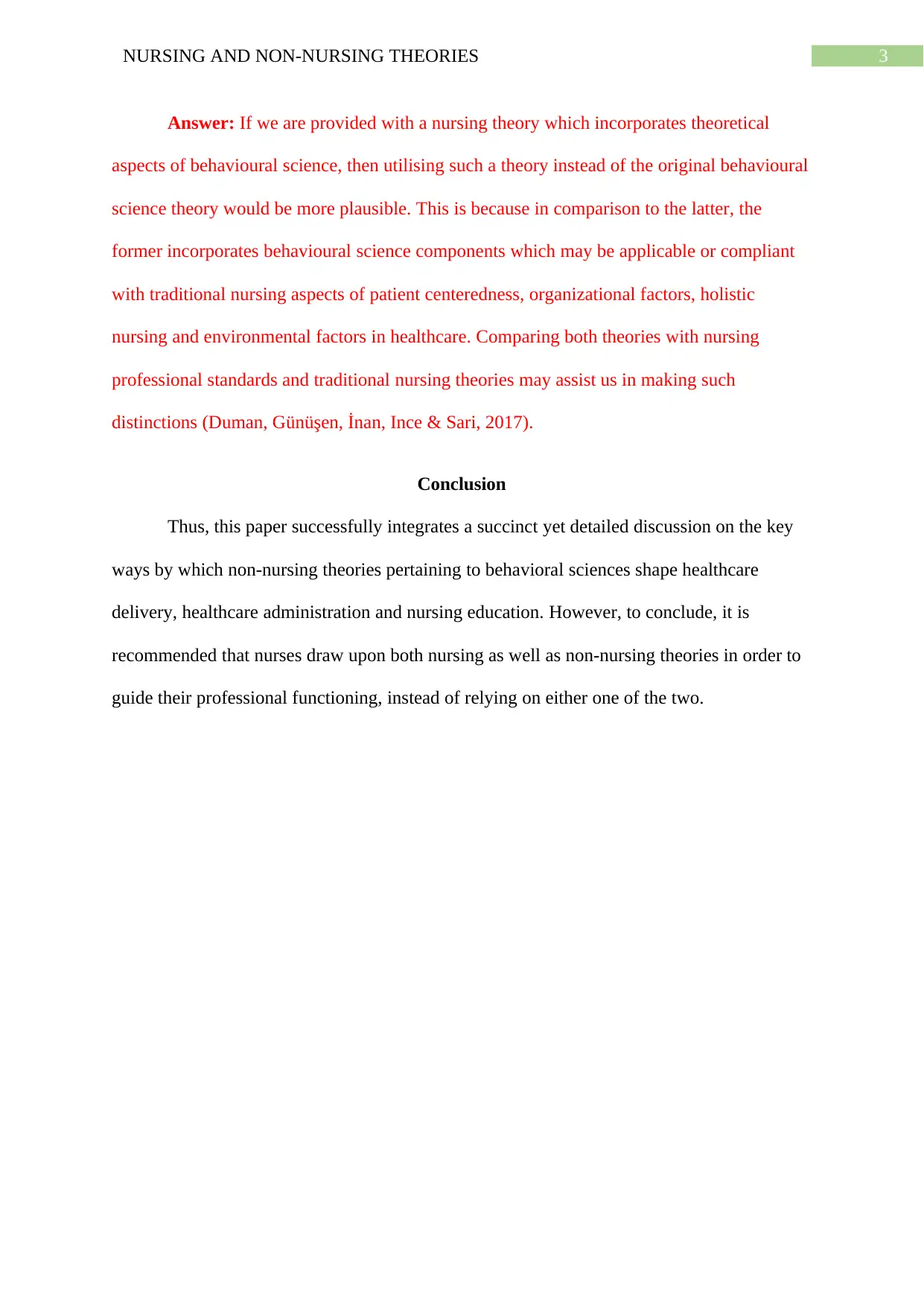
3NURSING AND NON-NURSING THEORIES
Answer: If we are provided with a nursing theory which incorporates theoretical
aspects of behavioural science, then utilising such a theory instead of the original behavioural
science theory would be more plausible. This is because in comparison to the latter, the
former incorporates behavioural science components which may be applicable or compliant
with traditional nursing aspects of patient centeredness, organizational factors, holistic
nursing and environmental factors in healthcare. Comparing both theories with nursing
professional standards and traditional nursing theories may assist us in making such
distinctions (Duman, Günüşen, İnan, Ince & Sari, 2017).
Conclusion
Thus, this paper successfully integrates a succinct yet detailed discussion on the key
ways by which non-nursing theories pertaining to behavioral sciences shape healthcare
delivery, healthcare administration and nursing education. However, to conclude, it is
recommended that nurses draw upon both nursing as well as non-nursing theories in order to
guide their professional functioning, instead of relying on either one of the two.
Answer: If we are provided with a nursing theory which incorporates theoretical
aspects of behavioural science, then utilising such a theory instead of the original behavioural
science theory would be more plausible. This is because in comparison to the latter, the
former incorporates behavioural science components which may be applicable or compliant
with traditional nursing aspects of patient centeredness, organizational factors, holistic
nursing and environmental factors in healthcare. Comparing both theories with nursing
professional standards and traditional nursing theories may assist us in making such
distinctions (Duman, Günüşen, İnan, Ince & Sari, 2017).
Conclusion
Thus, this paper successfully integrates a succinct yet detailed discussion on the key
ways by which non-nursing theories pertaining to behavioral sciences shape healthcare
delivery, healthcare administration and nursing education. However, to conclude, it is
recommended that nurses draw upon both nursing as well as non-nursing theories in order to
guide their professional functioning, instead of relying on either one of the two.
Paraphrase This Document
Need a fresh take? Get an instant paraphrase of this document with our AI Paraphraser
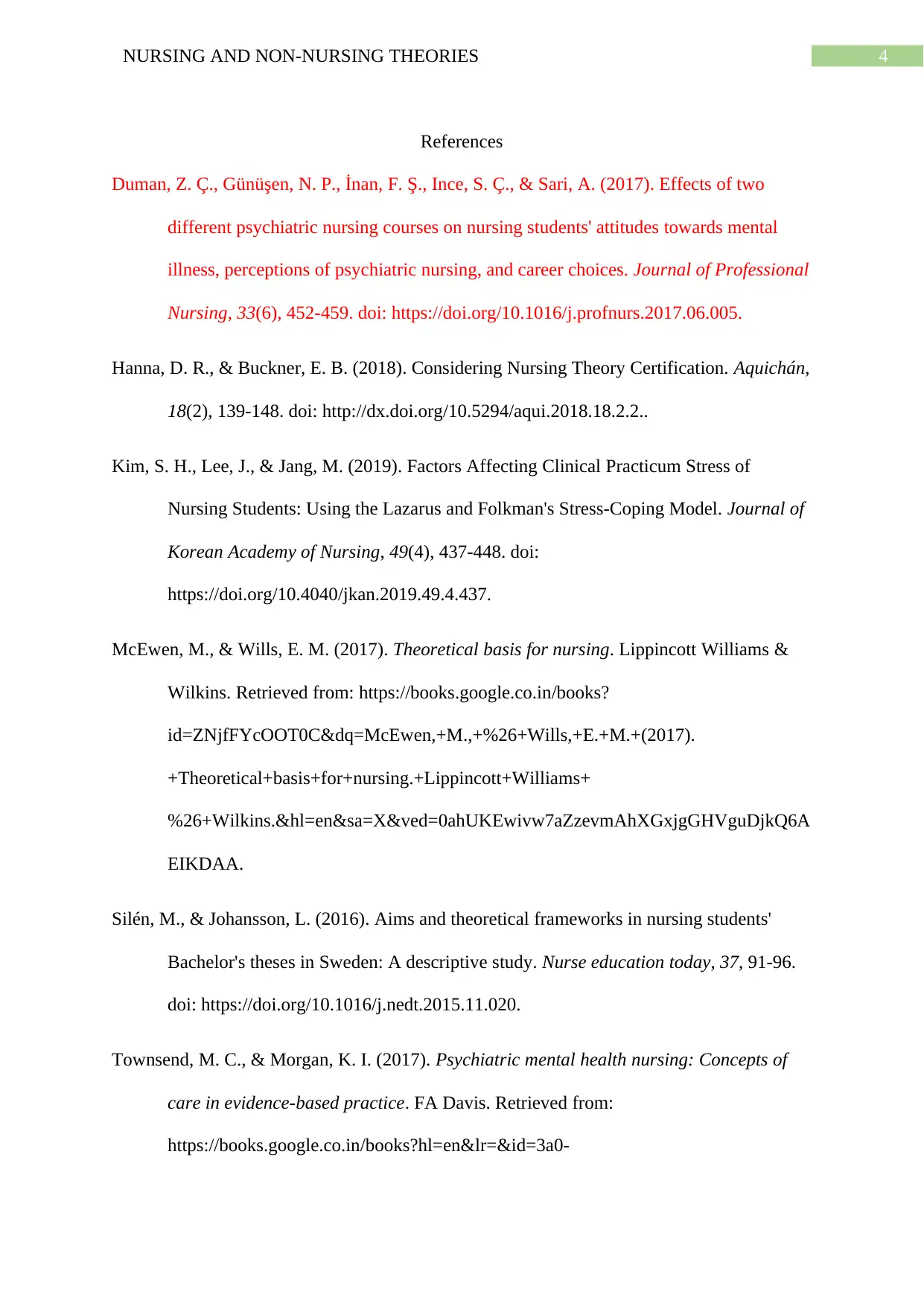
4NURSING AND NON-NURSING THEORIES
References
Duman, Z. Ç., Günüşen, N. P., İnan, F. Ş., Ince, S. Ç., & Sari, A. (2017). Effects of two
different psychiatric nursing courses on nursing students' attitudes towards mental
illness, perceptions of psychiatric nursing, and career choices. Journal of Professional
Nursing, 33(6), 452-459. doi: https://doi.org/10.1016/j.profnurs.2017.06.005.
Hanna, D. R., & Buckner, E. B. (2018). Considering Nursing Theory Certification. Aquichán,
18(2), 139-148. doi: http://dx.doi.org/10.5294/aqui.2018.18.2.2..
Kim, S. H., Lee, J., & Jang, M. (2019). Factors Affecting Clinical Practicum Stress of
Nursing Students: Using the Lazarus and Folkman's Stress-Coping Model. Journal of
Korean Academy of Nursing, 49(4), 437-448. doi:
https://doi.org/10.4040/jkan.2019.49.4.437.
McEwen, M., & Wills, E. M. (2017). Theoretical basis for nursing. Lippincott Williams &
Wilkins. Retrieved from: https://books.google.co.in/books?
id=ZNjfFYcOOT0C&dq=McEwen,+M.,+%26+Wills,+E.+M.+(2017).
+Theoretical+basis+for+nursing.+Lippincott+Williams+
%26+Wilkins.&hl=en&sa=X&ved=0ahUKEwivw7aZzevmAhXGxjgGHVguDjkQ6A
EIKDAA.
Silén, M., & Johansson, L. (2016). Aims and theoretical frameworks in nursing students'
Bachelor's theses in Sweden: A descriptive study. Nurse education today, 37, 91-96.
doi: https://doi.org/10.1016/j.nedt.2015.11.020.
Townsend, M. C., & Morgan, K. I. (2017). Psychiatric mental health nursing: Concepts of
care in evidence-based practice. FA Davis. Retrieved from:
https://books.google.co.in/books?hl=en&lr=&id=3a0-
References
Duman, Z. Ç., Günüşen, N. P., İnan, F. Ş., Ince, S. Ç., & Sari, A. (2017). Effects of two
different psychiatric nursing courses on nursing students' attitudes towards mental
illness, perceptions of psychiatric nursing, and career choices. Journal of Professional
Nursing, 33(6), 452-459. doi: https://doi.org/10.1016/j.profnurs.2017.06.005.
Hanna, D. R., & Buckner, E. B. (2018). Considering Nursing Theory Certification. Aquichán,
18(2), 139-148. doi: http://dx.doi.org/10.5294/aqui.2018.18.2.2..
Kim, S. H., Lee, J., & Jang, M. (2019). Factors Affecting Clinical Practicum Stress of
Nursing Students: Using the Lazarus and Folkman's Stress-Coping Model. Journal of
Korean Academy of Nursing, 49(4), 437-448. doi:
https://doi.org/10.4040/jkan.2019.49.4.437.
McEwen, M., & Wills, E. M. (2017). Theoretical basis for nursing. Lippincott Williams &
Wilkins. Retrieved from: https://books.google.co.in/books?
id=ZNjfFYcOOT0C&dq=McEwen,+M.,+%26+Wills,+E.+M.+(2017).
+Theoretical+basis+for+nursing.+Lippincott+Williams+
%26+Wilkins.&hl=en&sa=X&ved=0ahUKEwivw7aZzevmAhXGxjgGHVguDjkQ6A
EIKDAA.
Silén, M., & Johansson, L. (2016). Aims and theoretical frameworks in nursing students'
Bachelor's theses in Sweden: A descriptive study. Nurse education today, 37, 91-96.
doi: https://doi.org/10.1016/j.nedt.2015.11.020.
Townsend, M. C., & Morgan, K. I. (2017). Psychiatric mental health nursing: Concepts of
care in evidence-based practice. FA Davis. Retrieved from:
https://books.google.co.in/books?hl=en&lr=&id=3a0-
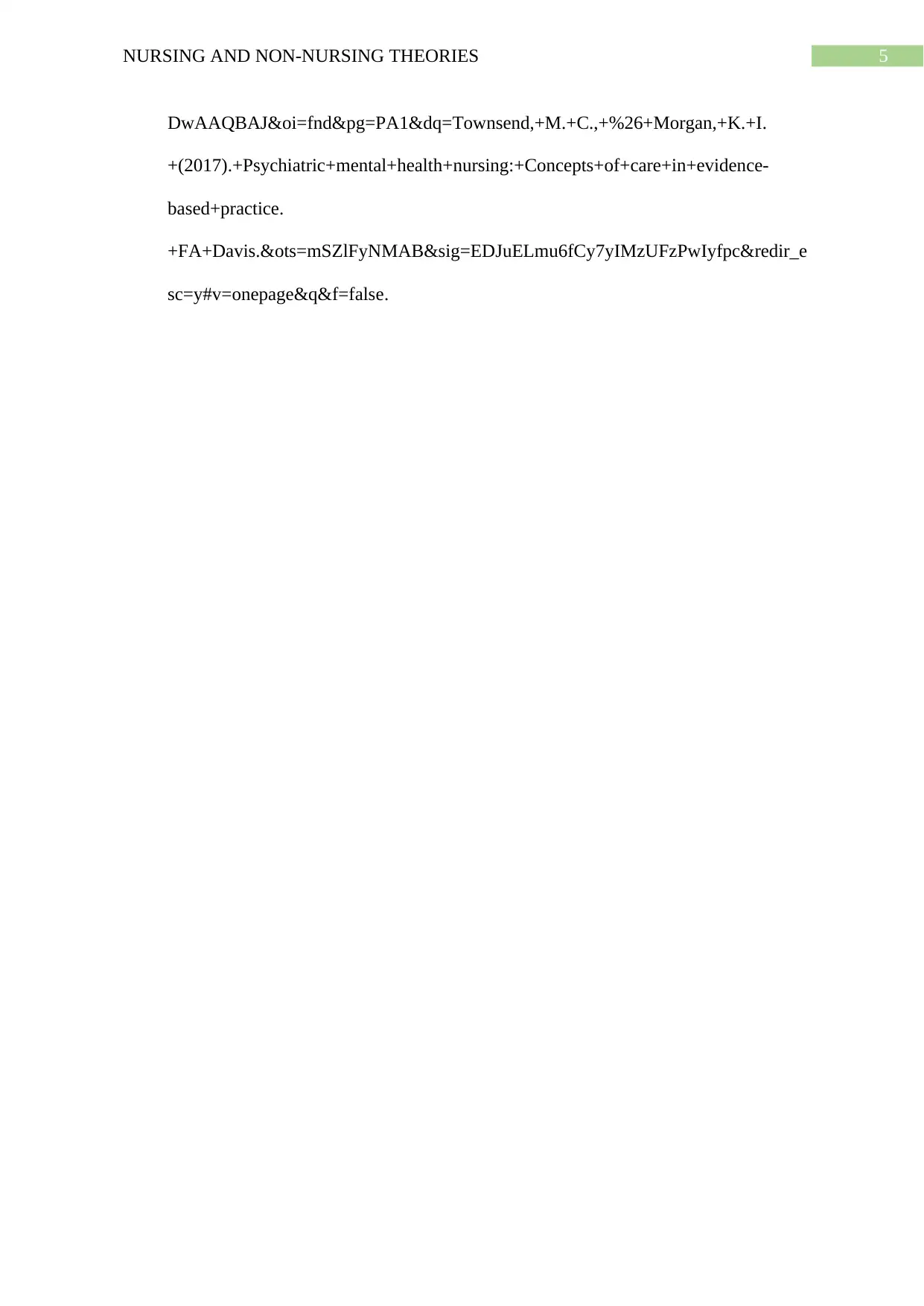
5NURSING AND NON-NURSING THEORIES
DwAAQBAJ&oi=fnd&pg=PA1&dq=Townsend,+M.+C.,+%26+Morgan,+K.+I.
+(2017).+Psychiatric+mental+health+nursing:+Concepts+of+care+in+evidence-
based+practice.
+FA+Davis.&ots=mSZlFyNMAB&sig=EDJuELmu6fCy7yIMzUFzPwIyfpc&redir_e
sc=y#v=onepage&q&f=false.
DwAAQBAJ&oi=fnd&pg=PA1&dq=Townsend,+M.+C.,+%26+Morgan,+K.+I.
+(2017).+Psychiatric+mental+health+nursing:+Concepts+of+care+in+evidence-
based+practice.
+FA+Davis.&ots=mSZlFyNMAB&sig=EDJuELmu6fCy7yIMzUFzPwIyfpc&redir_e
sc=y#v=onepage&q&f=false.
⊘ This is a preview!⊘
Do you want full access?
Subscribe today to unlock all pages.

Trusted by 1+ million students worldwide
1 out of 6
Related Documents
Your All-in-One AI-Powered Toolkit for Academic Success.
+13062052269
info@desklib.com
Available 24*7 on WhatsApp / Email
![[object Object]](/_next/static/media/star-bottom.7253800d.svg)
Unlock your academic potential
Copyright © 2020–2026 A2Z Services. All Rights Reserved. Developed and managed by ZUCOL.





